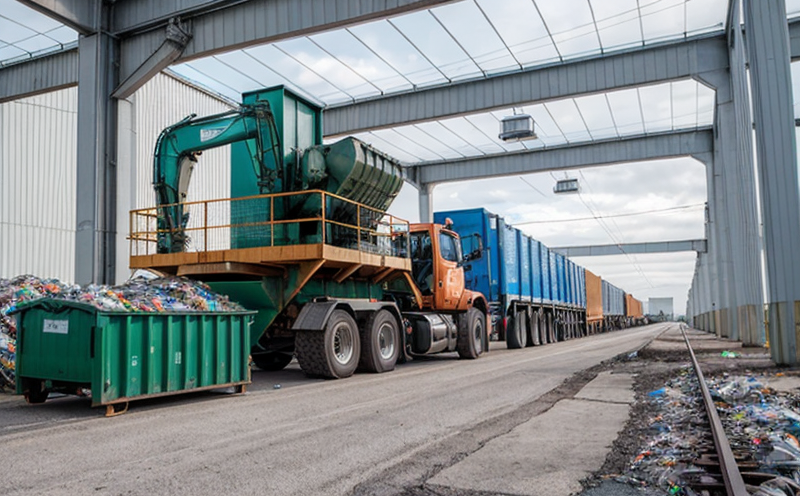ASTM D7611 Plastics Resin Identification Testing for Recycling
The ASTM D7611 standard provides a method for the identification of polymer resins in plastics recycling streams. This testing service is essential for quality managers, compliance officers, and R&D engineers involved in industrial manufacturing and processing to ensure that recycled materials meet specific standards and are properly sorted.
ASTM D7611 utilizes near-infrared spectroscopy (NIRS) to analyze the chemical composition of plastics. Near-infrared light is shone on the sample, and the absorption spectrum is analyzed to identify the type of resin present. This method allows for rapid identification of various polymer types such as polyethylene (PE), polypropylene (PP), polystyrene (PS), polyvinyl chloride (PVC), and more.
Specimen preparation involves cleaning and drying plastic samples before they are placed in the spectrometer. Proper sample preparation is crucial to ensure accurate results, as contaminants or residue can interfere with the spectroscopic analysis. Once prepared, the specimen is scanned using a near-infrared spectrometer equipped with appropriate calibration standards for plastics.
The output of ASTM D7611 testing provides detailed information about the composition and type of resin present in plastic waste streams. This data is critical for recycling facilities to sort materials correctly and ensure that recycled products meet quality specifications. By identifying different types of plastics, manufacturers can optimize their processes and reduce waste.
ASTM D7611 testing also plays a vital role in the circular economy by promoting sustainability. Recycling facilities use this information to maximize resource recovery and minimize environmental impact. Proper identification ensures that compatible materials are grouped together for reprocessing, which improves product quality and reduces energy consumption during manufacturing processes.
| Resin Type | Near-Infrared Spectrum Absorption Peaks (cm⁻¹) |
|---|---|
| Polyethylene Low-Density (LDPE) | 1745, 1650, 1320 cm⁻¹ |
| Polyethylene High-Density (HDPE) | 1708, 1654, 1490 cm⁻¹ |
| Polypropylene (PP) | 1652, 1370, 1230 cm⁻¹ |
| Polystyrene (PS) | 1648, 1490, 1150 cm⁻¹ |
| Polyvinyl Chloride (PVC) | 1732, 1630, 1550 cm⁻¹ |
The ASTM D7611 standard ensures consistent and reliable results across different facilities by providing standardized procedures. This is particularly important for global supply chains where consistency in product quality is essential.
For R&D engineers, this testing method offers valuable insights into the types of plastics available for recycling. By understanding the composition of plastic waste streams, they can develop innovative solutions to improve recycling processes and create new products from recycled materials.
Compliance officers also benefit greatly from ASTM D7611 testing as it helps them ensure that their facilities are meeting regulatory requirements related to waste management and resource recovery.
Industry Applications
- Recycling Facilities: Identifying different types of plastics in recycling streams.
- Manufacturing Plants: Ensuring the quality and compatibility of recycled materials used in production processes.
- R&D Labs: Studying the composition of plastic waste to develop new products from recycled materials.
- Sustainability Programs: Maximizing resource recovery and minimizing environmental impact in industrial operations.
The ASTM D7611 standard is widely accepted by various industries, including petrochemicals, plastics manufacturing, and recycling. Its broad applicability makes it an essential tool for anyone involved in the processing of recycled materials.
International Acceptance and Recognition
The ASTM D7611 standard is recognized globally as a reliable method for identifying polymer resins in plastics recycling streams. It has been adopted by numerous countries, including the United States, Europe, China, and Japan. The widespread acceptance of this standard ensures consistency across international borders.
International organizations such as the European Committee for Standardization (CEN) and the International Organization for Standardization (ISO) have endorsed ASTM D7611, further emphasizing its importance in global recycling efforts.
Environmental and Sustainability Contributions
By accurately identifying plastics through ASTM D7611 testing, industries can contribute significantly to environmental sustainability. This testing helps reduce waste by ensuring that recycled materials are properly sorted and reused in manufacturing processes.
The ability to recycle more plastics into new products reduces the need for virgin raw materials, conserving natural resources and reducing greenhouse gas emissions associated with production. Additionally, recycling plastics through ASTM D7611-supported methods contributes to a circular economy by promoting closed-loop supply chains where waste is continually repurposed.
Furthermore, proper identification of recycled plastics allows manufacturers to create products with consistent quality, which can lead to improved performance and longevity. This not only benefits the environment but also enhances customer satisfaction in the marketplace.





